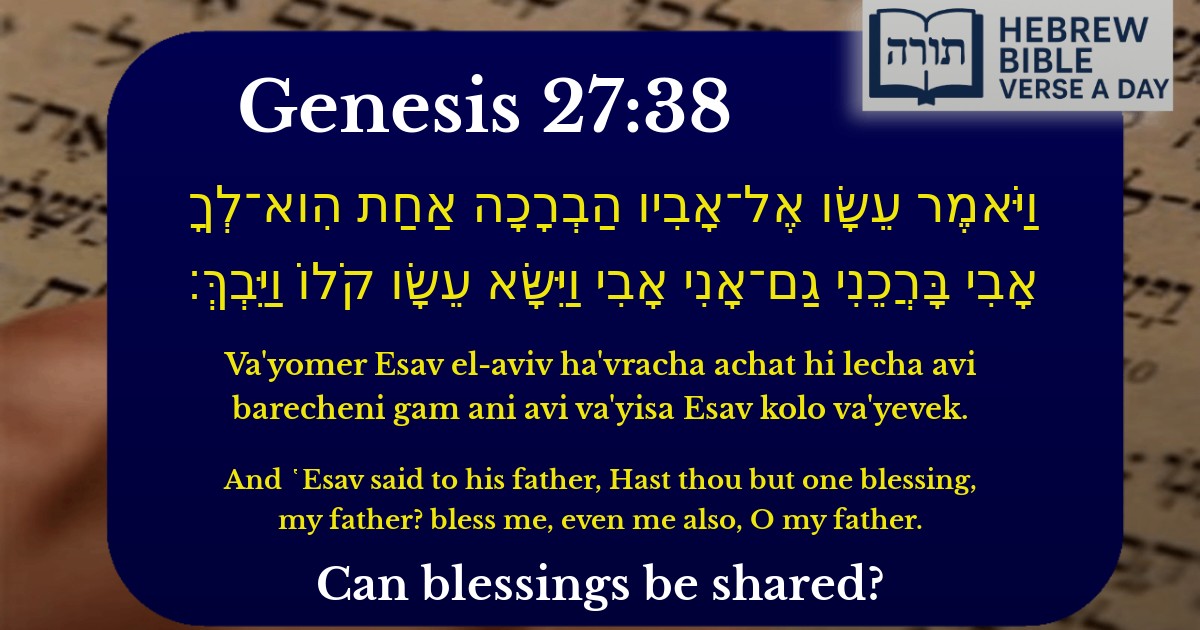Join Our Newsletter To Be Informed When New Videos Are Posted
Join the thousands of fellow Studends who rely on our videos to learn how to read the bible in Hebrew for free!
Hebrew Text
וַיֹּאמֶר עֵשָׂו אֶל־אָבִיו הַבְרָכָה אַחַת הִוא־לְךָ אָבִי בָּרֲכֵנִי גַם־אָנִי אָבִי וַיִּשָּׂא עֵשָׂו קֹלוֹ וַיֵּבְךְּ׃
English Translation
And ῾Esav said to his father, Hast thou but one blessing, my father? bless me, even me also, O my father.
Transliteration
Va'yomer Esav el-aviv ha'vracha achat hi lecha avi barecheni gam ani avi va'yisa Esav kolo va'yevek.
Hebrew Leining Text
וַיֹּ֨אמֶר עֵשָׂ֜ו אֶל־אָבִ֗יו הַֽבְרָכָ֨ה אַחַ֤ת הִֽוא־לְךָ֙ אָבִ֔י בָּרְכֵ֥נִי גַם־אָ֖נִי אָבִ֑י וַיִּשָּׂ֥א עֵשָׂ֛ו קֹל֖וֹ וַיֵּֽבְךְּ׃
וַיֹּ֨אמֶר עֵשָׂ֜ו אֶל־אָבִ֗יו הַֽבְרָכָ֨ה אַחַ֤ת הִֽוא־לְךָ֙ אָבִ֔י בָּרְכֵ֥נִי גַם־אָ֖נִי אָבִ֑י וַיִּשָּׂ֥א עֵשָׂ֛ו קֹל֖וֹ וַיֵּֽבְךְּ׃
🎵 Listen to leining
Parasha Commentary
📚 Talmud Citations
This verse is quoted in the Talmud.
📖 Megillah 16a
The verse is referenced in a discussion about the nature of blessings and the emotional response of Esau when he realizes he has lost his father's primary blessing.
📖 Sanhedrin 37b
The verse is cited in a broader discussion about repentance and the sincerity of Esau's plea for a blessing, contrasting it with Jacob's actions.


Understanding Esav's Plea
The verse (Bereishit 27:38) describes Esav's emotional reaction upon realizing that Yaakov had received Yitzchak's blessing. Rashi explains that Esav's question, "Havracha achat hi lecha avi?" ("Is there but one blessing, my father?"), reflects his mistaken belief that Yitzchak had only one blessing to give. This reveals Esav's limited spiritual understanding, as he viewed the blessings as finite material gifts rather than divine transmissions with unique spiritual qualities.
Esav's Tears and Their Significance
The Midrash (Bereishit Rabbah 67:4) notes that Esav's weeping ("vayisa Esav kolo vayevk") was sincere in that moment, prompting Hashem to grant him the blessing of material prosperity (as seen later in Bereishit 27:39-40). However, the Talmud (Bava Batra 16b) contrasts this with Yaakov's tears in later encounters, teaching that Esav's tears were self-serving, while Yaakov's represented genuine spiritual longing.
The Nature of the Blessings
Ramban explains that Yitzchak's blessings were not arbitrary but corresponded to the essential natures of Yaakov and Esav:
Halachic Perspective on Blessings
The Kli Yakar emphasizes that blessings are not zero-sum transactions. While Esav thought blessings were limited (like physical inheritances), Yitzchak demonstrated that divine blessings multiply according to each recipient's spiritual capacity. This reflects the principle found in Midrash Tanchuma (Nasso 16) that "bracha she'becha einah ela shetihyeh kol ha'olam mitbarech bishvilcha" ("your blessing is that the whole world should be blessed through you").
Esav's Misunderstanding of Repentance
Malbim observes that Esav's plea ("barecheini gam ani avi") came too late - only after losing the blessing did he seek it. This contrasts with Yaakov's proactive spiritual preparation. The Midrash (Pirkei D'Rabbi Eliezer 32) connects this to Esav's fundamental character flaw: valuing the blessing's results more than the spiritual relationship it represented.